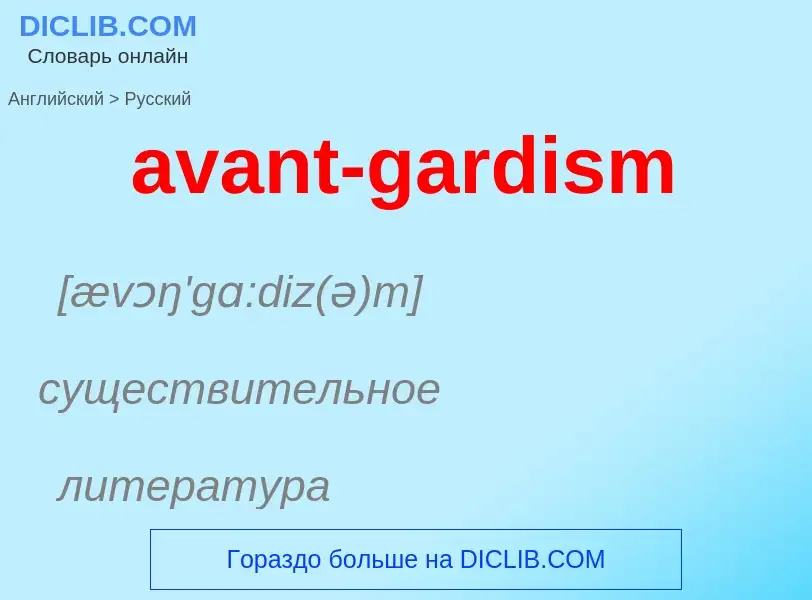Traducción y análisis de palabras por inteligencia artificial ChatGPT
En esta página puede obtener un análisis detallado de una palabra o frase, producido utilizando la mejor tecnología de inteligencia artificial hasta la fecha:
- cómo se usa la palabra
- frecuencia de uso
- se utiliza con más frecuencia en el habla oral o escrita
- opciones de traducción
- ejemplos de uso (varias frases con traducción)
- etimología
avant-gardism - traducción al ruso
[ævɔŋ'gɑ:diz(ə)m]
существительное
литература
авангардизм
[ævɔŋ'gɑ:d]
прилагательное
общая лексика
авангардистский
существительное
[ævɔŋ'gɑ:d]
общая лексика
авангард
авангардисты (в искусстве, литературе)
авангард, авангардисты (в искусстве, литературе)
Definición
Wikipedia

In the arts and in literature, the term avant-garde (advance guard and vanguard) identifies a genre of art, an experimental work of art, and the experimental artist who created the work of art, which usually is aesthetically innovative, whilst initially being ideologically unacceptable to the artistic establishment of the time. The military metaphor of an advance guard identifies the artists and writers whose innovations in style, form, and subject-matter challenge the artistic and aesthetic validity of the established forms of art and the literary traditions of their time; thus how the artists who created the anti-novel and Surrealism were ahead of their times.
As a stratum of the intelligentsia of a society, avant-garde artists promote progressive and radical politics and advocate for societal reform with and through works of art. In the essay "The Artist, the Scientist, and the Industrialist" (1825) Benjamin Olinde Rodrigues's political usage of vanguard identified the moral obligation of artists to "serve as [the] avant-garde" of the people, because "the power of the arts is, indeed, the most immediate and fastest way" to realise social, political, and economic reforms.
In the realm of culture, the artistic experiments of the avant-garde push the aesthetic boundaries of societal norms, such as the disruptions of modernism in poetry, fiction, and drama, painting, music, and architecture, the occurred in the late 19th and in the early 20th centuries. In art history the socio-cultural functions of avant-garde art trace from Dada (1915–1920s) through the Situationist International (1957–1972) to the Postmodernism of the American Language poets (1960s–1970s).



![Fountain]]'' (1917) by [[Marcel Duchamp]].<br> ([[Alfred Stieglitz]]) Fountain]]'' (1917) by [[Marcel Duchamp]].<br> ([[Alfred Stieglitz]])](https://commons.wikimedia.org/wiki/Special:FilePath/Marcel Duchamp, 1917, Fountain, photograph by Alfred Stieglitz.jpg?width=200)
